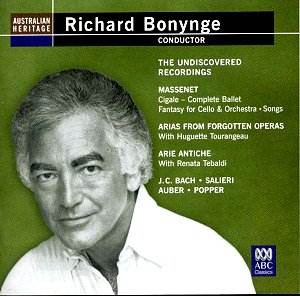
Richard Bonynge, conductor. The Undiscovered
Recordings
Jules MASSENET
(1842-1912)
Cigale – Ballet in 2 Acts
Enid Hartle (mezzo soprano)
London Voices and National Philharmonic Orchestra
Daniel François
Esprit AUBER (1782-1871)
Cello Concerto No 1 orch. Douglas Gamley
David POPPER (1843-1913)
Cello Concerto in E minor Op 24
Jules MASSENET
(1842-1912)
Fantasy for Cello and Orchestra
Jascha Silberstein (cello)
L’Orchestre de la Suisse Romande
Johann Christian BACH
(1735-1782)
Sinfonia Concertante in C T289/4 C43 for flute,
oboe, violin, cello and orchestra ed. Bonynge
Richard Adeney (flute), Peter Graeme (oboe),
Emanuel Hurwitz (violin) and Keith Harvey (cello)
with the English Chamber Orchestra
Antonio SALIERI
(1750-1825)
Sinfonia in D (Veneziana) ed. Bonynge
Concerto in C for flute, oboe and orchestra
ed Bonynge
Richard Adeney (flute), James Brown (oboe)
English Chamber Orchestra
Michael BALFE (1808-1870)
Sventurata Ildegona from Ildegona nel Carcere
Georges BIZET (1838-1875)
Nour-Eddin, Roi de Lahore from Djamileh
Gaetano DONIZETTI
(1797-1848)
Al mio core from L’assedio di Calais orch Douglas
Gamley
Daniel François
Esprit AUBER (1782-1871)
Ah pour un jeune Coeur from Le cheval de bronze
Jules MASSENET
(1842-1912)
C’est sa tête que je réclame from
Hérodiade
Giuseppe VERDI
(1813-1901)
Ah! Sgombro è il loco alfin from Oberto
Nicola VACCAI (1790-1848)
E questo il loco from Giulietta e Romeo
Aimé MAILLART
(1817-1871)
Il m’aime, il m’aime from Les Dragons de Villars
Huguette Tourangeau (mezzo soprano)
L’Orchestre de la Suisse Romande
Jean Paul MARTINI
(1741-1816)
Plaisir d’amor arr Douglas Gamley
Giuseppe SARTI
(1729-1802)
Lungi dal caro bene from Giulio Sabino
Giovanni Battista BONONCINI
(1670-1747)
Deh più a me non v’ascondete arr Douglas
Gamley
George Frideric HANDEL
(1685-1759)
Verdi prati, selve amene from Alcina
Frondi tenere…ombra mai fù
Alesandro SCARLATTI
(1660-1725)
Le Violette arr Douglas Gamley
Christoph Willibald GLUCK
(1714-1787)
Divinités du Styx from Alceste
O del mio dolce ardour from Paride ed Elena
Giovanni PAISELLO (1740-1816)
Nel cor più non mi sento from La Molinara
Chi vuol la zingarella from I zingari in fiera
Giovanni PERGOLESI
(1710-1736)
Stizzoso, mio Stizzoso fro La Serva Padrona
Vincenzo CIAMPI
(1710-1762)
Tre giorni son che Nina from Gli tre cicisbei
ridicoli
Antonio VIVALDI
(attributed) (1678-1741)
Piango, gemo, sospiro arr Douglas Gamley
Renata Tebaldi (soprano)
New Philharmonia Orchestra
Jules MASSENET
(1842-1912)
Le sais tu?
On dit! *
Passionnément
L’âme des fleurs
Pensée d’automne
Souvenance
Le petit Jésus
Les yeux clos *
Ce que dissent les cloches
La mélodie des baisers
Pitchounette
Nuit d’Espagne
L’Éventail
Je t’aime *
Les amoureuse sont des folles
Printemps dernier
Rose d’Octobre
Sérénade d’automne
Souhait
Elle s’en est allée
![]() Huguette Tourangeau (mezzo soprano)
Huguette Tourangeau (mezzo soprano)
Reginald Kilbey (cello) *
Richard Bonynge (piano)
Recorded 1967-78
![]() ABC CLASSICS 475 070 2 [4 CDs 304.49]
ABC CLASSICS 475 070 2 [4 CDs 304.49]